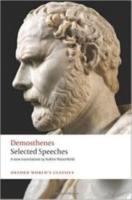
Oxford World’s Classics (2014) p/b 528pp £11.99 (ISBN 9780199593774)
Numbed by the stumbling, bumbling repetitive rhodomontade of modern electioneering rhetoric, the reviewer found himself delighted to be plunged into Demosthenes, a statesman and orator whose speeches seemed, at school, to hit the depths of tedium. Here, Demosthenes’ appeals to the Athenians to resist the gradual military advance of Philip II of Macedon in the 4th C BC; his attacks on his pro-Philip political rival Aeschines; his public cases against (for example, if it is by Demosthenes) the woman Neaera for a life-style that threatened the security of the Athenian city state; and private cases on behalf of clients bringing suits for assault and battery, or for flooding to a property by a diverted water-course—all, however self-serving, impress with their emotional intensity, brilliance and variety of argument (dishonest or not), irony, forceful imagery, wit and general sense of mastery of the spoken word, in Robin Waterfield’s fine new translations.
They also tell one a very great deal about ancient Greek life and values. As Sir Kenneth Dover argued in his wonderful Popular Morality in the Time of Plato and Aristotle (Blackwell), there is nothing like a speech in court designed to win the votes of a jury of ordinary Athenians-in-the-street to reveal everything you ever wanted to know about the prejudices of the common man (there was no presiding judge, no rules of evidence). Can one imagine the reaction of a court today to a speaker saying that he had brought a case ‘to seek revenge for what [my opponent] has done to me’? But in 4th C Athens, no motive could be more praiseworthy. Again, if Demosthenes often seems to spend too much time talking about himself, modesty in public life was not a quality widely admired by the populace.
The excellent historical introduction and notes by Professor Christopher Carey locate each speech firmly in its wider context and help to make this selection of speeches the ideal introduction to one of the ancient world’s greatest orators. Camilibeggfarurgeon, however unlettered in ancient Greek, could profitably make up some of the leeway here.
Peter Jones
